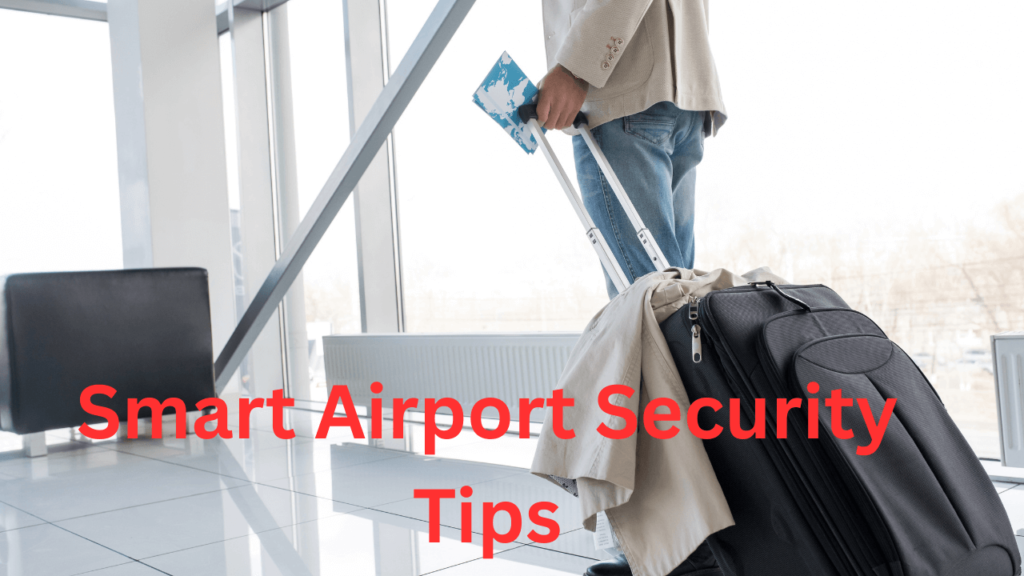Traveling today is exciting but can also be stressful, especially when it comes to navigating airport security. Whether you’re heading on a short business trip, a weekend getaway, or a long international adventure, airport security checks can make or break the start of your journey. For some people, it’s the part of travel they dread most: the lines, the rules, the occasional confusion, and the worry of holding up others.
That’s why learning smart airport security tips is more important than ever. Not only does it help reduce stress, but it also keeps you safer, saves time, and ensures your trip begins smoothly. Having traveled through airports across Europe, the Middle East, and the U.S., I’ve picked up strategies that consistently work—and I’ll combine those experiences with research and expert advice here.
In this guide, you’ll find practical, research-backed, and personally informed tips to get through security efficiently, stay organized, and avoid unnecessary problems.
Why Airport Security Matters More Than Ever
Airports today are busier than they’ve ever been. According to the International Air Transport Association (IATA), over 4.5 billion passengers traveled by air globally in 2019, and after the pandemic, numbers are rapidly rebounding. With this increase comes higher pressure on security systems designed to keep travelers safe.
Airport security isn’t just about rules—it’s about balancing convenience and protection. While it might feel inconvenient at times, these systems have prevented countless risks. The challenge is learning how to work with security procedures instead of against them.
I remember one flight from Dublin to Frankfurt where I didn’t properly organize my liquids. By the time I reached the scanner, I was fumbling through my bag in front of dozens of impatient passengers. Compare that with another trip through Amsterdam Schiphol, where I pre-packed everything neatly into trays—it made me feel calmer, faster, and less stressed. Small changes really do add up.
Smart Packing: The First Step to Smooth Security
1. Master the 3-1-1 Rule (Liquids and Gels)
Most airports follow the 100ml (3.4oz) rule for liquids, gels, and aerosols. These items must fit into a clear, resealable 1-liter plastic bag. Forgetting this can cause delays, and sometimes confiscation.
Smart tip: Before you leave home, put all your liquids in the transparent bag and keep it accessible in your hand luggage. I always keep a spare bag in my backpack—many airports provide them, but not all.
2. Organize Electronics
Laptops, tablets, e-readers, and large cameras usually need to be removed from your bag and placed separately in trays. Some modern airports now have advanced CT scanners that allow electronics to stay inside, but you can’t always count on this.
Smart tip: Pack electronics near the top of your carry-on for easy removal. I use a slim laptop sleeve so I don’t waste time digging through clothes.
3. Wear Security-Friendly Outfits
Think of security as part of your travel plan when choosing clothes:
- Avoid belts with metal buckles.
- Slip-on shoes are faster than boots with laces.
- Jackets and coats usually must come off—keep them easy to remove.
Once, flying from New York JFK, I saw a traveler with heavy boots, jewelry, and a belt—he set off the scanner three times and spent nearly 10 minutes being screened. A simple outfit choice can save you stress.
Documents and Preparation: Stay Ready
4. Keep Your Passport and Boarding Pass Handy
One of the most common time-wasters is people searching through bags for documents at the last second. Always keep your ID, boarding pass, and travel documents in an easily reachable pocket.
I use a slim travel wallet that fits into my jacket pocket. When security officers ask, I don’t need to fumble—I simply hand it over.
5. Use Digital Boarding Passes, But Keep a Backup
Mobile boarding passes are convenient, but don’t rely on them entirely. Phones can die, apps can glitch, or scanners may not work. I usually carry both a digital and a paper version just in case.
Speeding Things Up: Lines and Timing
6. Choose the Right Line
Not all lines move at the same pace. Families with small kids, large groups, or inexperienced travelers often take longer. Business travelers usually move quicker. Observing the crowd before choosing a line can save minutes.
7. Arrive Early, But Not Too Early
Most airlines recommend arriving 2–3 hours before international flights and at least 90 minutes before domestic ones. This buffer gives you time for unexpected issues like long queues or secondary screening.
From personal experience, arriving too late is nerve-wracking, but arriving too early can be just as tiring—you end up waiting around at the gate. Aim for the sweet spot: enough time for security, but not so much that you’re drained before boarding.
Advanced Options: Programs and Tech
8. Consider Trusted Traveler Programs
In the U.S., programs like TSA PreCheck, Global Entry, and CLEAR allow pre-approved travelers to skip long lines or avoid removing shoes and laptops. Similar systems exist in Europe, such as Registered Traveller in the UK.
These programs aren’t free (TSA PreCheck costs around $78 for 5 years), but they can save frequent travelers enormous amounts of time and stress.
9. Watch Out for Smart Lanes
Many major airports now use automated security lanes with multiple stations for placing trays. Passengers don’t queue in a single line but can prepare at different spots, which speeds things up.
When I used one at Munich Airport, it cut my wait time by half compared to traditional lanes.
Security Etiquette: Helping Yourself and Others
10. Be Ready Before You Reach the Tray
The people who slow down lines the most are those who start unpacking at the scanner instead of preparing beforehand. While in line, empty your pockets, take off your jacket, and hold your liquids and electronics.
11. Respect the Officers
Security officers aren’t trying to ruin your trip—they’re doing their job. A polite attitude goes a long way, especially if you’re pulled aside for extra screening. I’ve seen frustrated travelers argue, which only makes the process longer.
12. Don’t Joke About Security
It should go without saying, but never joke about weapons, bombs, or contraband. Even a lighthearted comment can result in delays, questioning, or missing your flight.
Handling Special Situations
Traveling With Kids
- Pack snacks separately (and check liquid restrictions for baby formula).
- Explain the process to children ahead of time so they’re not scared.
- Strollers often need separate screening.
Traveling With Medical Needs
If you have prescription medication, keep it in its original container with a doctor’s note if necessary. Medical devices like insulin pumps can go through security, but you should inform officers in advance.
Traveling During Busy Periods
Holidays and weekends are peak times. A 2019 TSA report showed that the Thanksgiving weekend saw record-breaking security checks, with nearly 27 million travelers screened in the U.S. alone. If traveling during peak periods, add extra time.
Common Mistakes to Avoid
- Forgetting liquids outside of the plastic bag.
- Wearing too much jewelry.
- Carrying prohibited items (scissors, sharp objects, oversized liquids).
- Packing your boarding pass deep in your luggage.
- Getting frustrated with staff or other passengers.
The Psychological Side: Stay Calm and Confident
Airport security can cause anxiety for many travelers, especially first-timers. Studies on travel stress suggest that predictability reduces anxiety—when people know what to expect, they feel calmer.
This is why preparing your bag, documents, and mindset in advance is so effective. Personally, I treat airport security like a mini-challenge: if I can get through smoothly and quickly, it feels like a small win before my trip begins.
Frequently Asked Questions (FAQs)
Q: Can I bring food through security?
Yes, solid foods like sandwiches or fruit are usually fine. Liquids (soups, sauces, yogurts) must follow the 100ml rule.
Q: What happens if I forget to take out my laptop?
Security officers will ask you to go back and re-screen your bag, which wastes time. Always prepare in advance.
Q: How much liquid can I carry in total?
Up to 1 liter, divided into 100ml containers. Larger bottles, even if partly empty, are not allowed.
Q: Are security rules the same everywhere?
Most international airports follow similar guidelines, but some variations exist. Always check your departure airport’s rules.
Conclusion: Start Your Trip the Smart Way
Airport security doesn’t have to be stressful—it can actually be one of the easiest parts of your journey if you prepare well. From organizing your bag to dressing smartly, keeping documents ready, and understanding rules, you can move through checkpoints with confidence.
Personally, I’ve found that treating security as part of the trip, not an obstacle, changes the mindset completely. Instead of dreading it, I focus on being efficient, calm, and considerate of others.
So next time you fly, try implementing even a few of these smart airport security tips. You’ll save time, reduce stress, and maybe even enjoy the process.
✈️ Have you ever had a good or bad experience at airport security? What’s your go-to strategy for getting through smoothly? I’d love to hear your thoughts and tips—share them in the comments or reach out with your experiences!

Hi, I’m Tanvir, the founder and author of Explore Ireland Now. With a deep love for Ireland and its rich culture, history, and landscapes, I created this site to share everything that makes this beautiful country worth exploring. Whether you’re a local looking for hidden gems or a traveler planning your next adventure, I provide insightful guides, tips, and recommendations to help you experience Ireland to the fullest.
From stunning landscapes to vibrant cities and quaint villages, Ireland is full of wonders waiting to be discovered. Through my personal experiences and research, I aim to bring you the most up-to-date information and inspiration for your journey.
Thank you for visiting Explore Ireland Now—I hope my content helps you uncover all that this incredible country has to offer! If you have any questions or need travel advice, feel free to reach out.



